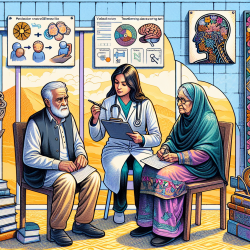Introduction
The COVID-19 pandemic has presented numerous challenges for children with congenital Zika syndrome (CZS), a condition that already poses significant barriers to participation in daily activities. A recent study titled "The burden of global outbreaks: Photos of the daily lives of children with congenital Zika syndrome during the COVID-19 pandemic" offers valuable insights into the lived experiences of these children and their families. As practitioners in the field of speech-language pathology, we can harness these insights to enhance our online therapy services, such as those provided by TinyEYE, to better support children with CZS.
Understanding the Research
The study utilized a participatory action research framework, engaging seven young Brazilian mothers as co-researchers to document their children's experiences using photovoice. This method involved capturing photographic narratives that revealed the children's participation preferences, family dynamics, access to healthcare and education, and the impact of social isolation during the pandemic. The findings underscore the critical role of family relationships and the negative consequences of disrupted therapy and education services.
Key Findings and Implications for Practice
- Participation Preferences: The study highlighted the children's desire for autonomy and social interaction, emphasizing the importance of incorporating play and family involvement in therapy sessions.
- Family Relationships: A supportive family environment was found to be crucial for the children's development, suggesting that therapy should engage family members as active participants.
- Access to Healthcare and Education: The lack of access to essential services during the pandemic negatively impacted the children's development, highlighting the need for robust teletherapy solutions that can bridge these gaps.
- Social Isolation: While some children benefited from increased family time, the overall impact of social isolation was detrimental, necessitating strategies to facilitate social engagement through virtual platforms.
Enhancing Online Therapy Services
As practitioners, we can leverage these insights to refine our online therapy services. Here are some actionable strategies:
- Integrate Family-Centered Approaches: Encourage family members to participate in therapy sessions, providing them with tools and strategies to support their child's development at home.
- Focus on Play and Social Interaction: Design therapy activities that promote play and social interaction, even in a virtual setting, to meet the children's participation preferences.
- Enhance Accessibility: Ensure that therapy materials and platforms are accessible to all families, considering technological and language barriers.
- Utilize Photovoice Techniques: Incorporate photovoice methods in therapy to empower families to share their experiences and insights, fostering a collaborative approach to care.
Encouraging Further Research
The study calls for more research using participatory methods like photovoice to deepen our understanding of the challenges faced by children with CZS. Practitioners are encouraged to engage in or support research initiatives that explore innovative ways to enhance participation and outcomes for these children.
To read the original research paper, please follow this link: The burden of global outbreaks: Photos of the daily lives of children with congenital Zika syndrome during the COVID-19 pandemic.










